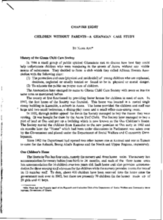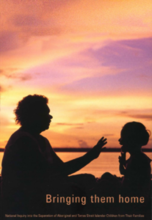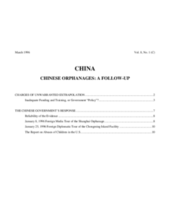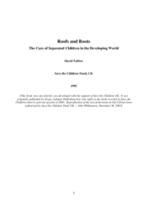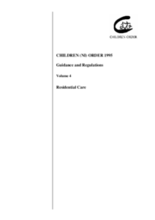Displaying 1441 - 1450 of 1463
This chapter provides an overview of a child care institution, the Osu Children’s Home, in Ghana.
This report from Australia's Human Rights and Equal Opportunity Commission aimed to trace the past laws, practices and policies which resulted in the separation of Aboriginal and Torres Strait Islander children from their families by compulsion, duress or undue influence, and the effects of those laws, practices and policies.
Ideas and country examples on how to create or transform an educational centre for children living and working on the street.
In order to investigate orphans' situation and development in Iraqi Kurdistan, samples from the two available orphan care systems, the traditional foster care and the modem orphanages, are examined at an index test and at 1-year follow-up regardin
This report is a follow up to HRW/Asia's publication of "Death By Default" on January 7, 1996, which found that most orphaned or abandoned children in China die within one year of their admittance to state-run orphanages and that the government does little or nothing to prevent this loss of life—despite the modest economic cost of so doing.
Save the Children’s research and analysis of residential care services and the need for alternative non-institutional approaches for children separated from their families. This book examines policy and practices from work in Africa, Asia, Latin America and the Caribbean, and Eastern and Central Europe.
A comprehensive document outlining standards for residential care in Northern Ireland.
As part of phase one of the development of the Martin James Foundation's Asia Care Network, comprehensive studies of the care system in each country were conducted to highlight the need for developing alternative care systems across South-East Asia. This case study highlights relevant data from Cambodia.
As part of phase one of the development of the Martin James Foundation's Asia Care Network, comprehensive studies of the care system in each country were conducted to highlight the need for developing alternative care systems across South-East Asia. This case study highlights relevant data from Thailand.
As part of phase one of the development of the Martin James Foundation's Asia Care Network, comprehensive studies of the care system in each country were conducted to highlight the need for developing alternative care systems across South-East Asia. This case study highlights relevant data from Myanmar.

